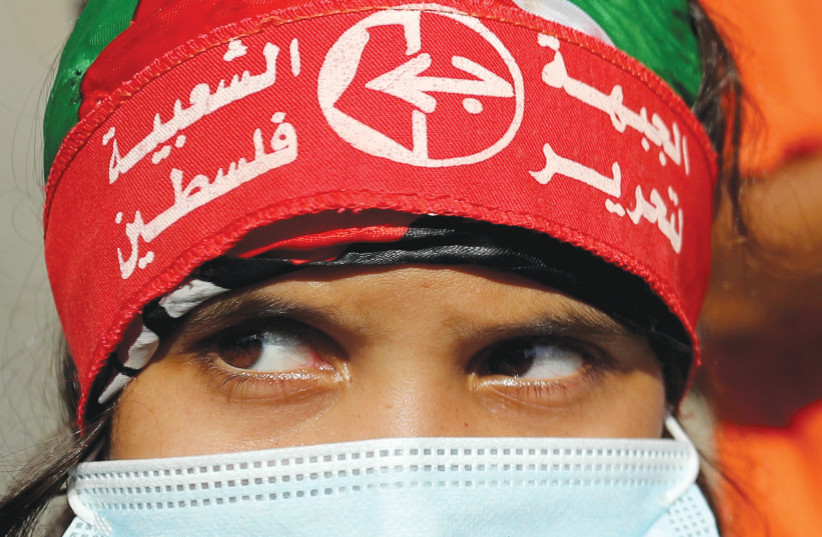Over the past month, Israel has been lambasted for designating six Palestinian non-governmental organizations as fronts for the Popular Front for the Liberation of Palestine, a US- and EU-designated terrorist group.
The Israeli designation process is not an arbitrary one according to Israel’s Counter-Terrorism Law, which articulates the multi-faceted procedure involving security agencies, the attorney-general, and the defense and justice ministers.
Under the law, and with an understanding that many lives could be at stake – after all, several NGO officials in the PFLP network are already on trial for murder – they begin investigating the suspected groups based on systematic collection of relevant information. If the initial concerns are verified, the terror designation follows. This process is standard practice in countries around the world, including the US.
Even without access to Israel’s classified evidence, donor governments should have long ago opened investigations into the NGOs based on the public, independently verifiable information alone. The default policy should not be “fund suspected groups until terror is proven”; it should be “stop funding if terror is suspected, and launch an independent investigation.” In other words – if there is doubt, there is no doubt.
For over a decade, NGO Monitor’s research has exposed multiple links between the six designated NGOs (among others) and the PFLP. Open-source information reveals that a number of their directors, board members and senior employees either currently or formerly held positions in the PFLP.

Yet these organizations continue to receive core funding from European governments, paying for salaries, infrastructure and beyond. According to NGO Monitor’s analysis, 13 Palestinian NGOs tied to the PFLP have received government grants totaling approximately $200 million since 2011. But the officials who provide the funding have willfully ignored and turned away from evidence of these ties.
This deliberate disregard is partly because European government officials are blinded by the “halo” effect granted to supposed humanitarian NGOs, which merely need to label themselves as human rights defenders to stave off any scrutiny. In doing so, these officials and like-minded activists overlook easily accessible information and the long history of NGOs linked to terror (Islamic Relief Worldwide and Green Without Borders have each been involved in incidents).
Imagine if evidence of a similar magnitude emerged about a European-funded NGO tied to al-Qaeda. Would NGO defenders and government funders ignore the terror links of 11 employees, including senior executives, from a single group? Undoubtedly, donor governments would immediately halt funding.
Instead, the lax attitude displayed by many donors allows funds to flow freely to terror-linked Palestinian NGOs.
In contrast, a number of prominent financial institutions acted quickly to cease cooperation with the newly designated NGOs – well before Israel designated them. In 2018, Citibank and Arab Bank closed accounts for Defense for Children International-Palestine, and Visa, Mastercard and American Express shut down online credit card donations to Al-Haq and the Union of Agricultural Work Committees (UAWC). These institutions erred on the side of caution, as should nation-states, especially when it comes to human lives and taxpayer dollars.
Slowly, it seems, European governments are taking a more responsible tact. In July 2020, the Dutch development minister acknowledged that a government audit determined that Dutch funds paid the salaries of then-UAWC accountant Samer Arbid and another senior employee allegedly involved in the 2019 killing of 17-year-old Rina Shnerb by a PFLP cell. In response to this finding and other concerns, the Netherlands suspended its aid delivery to the group.
Several other European institutions have also belatedly begun to combat this phenomenon. For example, concerns over aid diversion to terror led the EU anti-fraud mechanism, OLAF, to launch an investigation in August into their financial support to PFLP-linked Palestinian NGOs.
While these are encouraging developments, they would not have been necessary had the aid distribution process been conducted efficiently in the first place. Instead, Europe’s lack of transparency and accountability mechanisms for NGO funding either failed to detect the ties or chose to ignore them.
To safeguard the integrity of international humanitarian aid and prevent the laundering of taxpayer funds, donor governments have an obligation to examine the evidence carefully and act swiftly in the face of potential wrongdoing.
Itai Reuveni is director of communications at NGO Monitor. Eitan Fischberger is international relations and communications associate at NGO Monitor.
